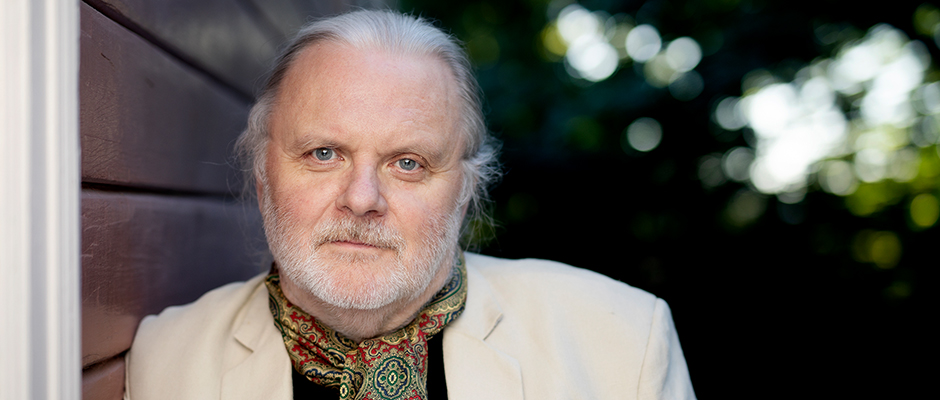2024世界戏剧日献辞人
Jon FOSSE, Norway
Norwegian writer, playwright
Jon Fosse is a renowned Norwegian writer born in 1959. He is known for his extensive body of work, which includes plays, novels, poetry collections, essays, children's books, and translations. Fosse's writing style is characterized by minimalism and emotional depth, making him one of the most performed playwrights in the world. In 2023, he was awarded the Nobel Prize in Literature for his innovative plays and prose that give voice to the unsayable.
Fosse's work has been translated into over fifty languages, with productions presented on over a thousand stages worldwide. His minimalist and introspective plays, often bordering on lyrical prose and poetry, continue the dramatic tradition established by Henrik Ibsen in the 19th century. Fosse's work has been associated with post-dramatic theatre, and his notable novels have been described as post-modernist and avant-garde due to their minimalism, lyricism, and unconventional use of syntax.
Fosse gained international acclaim as a dramatist with his play "Nokon kjem til å komme" (1996; "Someone Is Going to Come", 2002), known for its radical reduction of language and powerful expression of human emotions. Inspired by artists like Samuel Beckett and Thomas Bernhard, Fosse combines local ties with modernist techniques. His works portray the uncertainties and vulnerabilities of human experiences without nihilistic contempt.
In his plays, Fosse often leaves incomplete words or acts, creating a sense of unresolved tension. Themes of uncertainty and anxiety are explored in plays like "Natta syng sine songar" (1998; "Nightsongs", 2002) and "Dødsvariasjonar" (2002; "Death Variations", 2004). Fosse's courage in delving into everyday life's anxieties has contributed to his widespread recognition.
Fosse's novels, such as "Morgon og kveld" (2000; "Morning and Evening", 2015) and "Det er Ales" (2004; "Aliss at the Fire", 2010), showcase his unique language characterized by pauses, interruptions, negations, and profound questioning. The trilogy "Trilogien" (2016) and the septology "Det andre namnet" (2019; "The Other Name", 2020) further demonstrate Fosse's exploration of love, violence, death, and reconciliation.
Fosse's use of imagery and symbolism is evident in his poetic works, including "Sterk vind" (2021) and his poetry collection "Dikt i samling" (2021). He has also translated works by Georg Trakl and Rainer Maria Rilke into Nynorsk.
Overall, Jon Fosse's works delve into the essence of the human condition, tackling themes of uncertainty, anxiety, love, and loss. With his unique writing style and profound exploration of everyday situations, he has established himself as a major figure in contemporary literature and theatre.
>>More info about Jon FOSSE, in English
>>More info about Jon FOSSE, in French
>>More info about Jon FOSSE, in Greek
>>More info about Jon FOSSE, in Italian
>>More info about Jon FOSSE, in Kurdish
>>More info about Jon FOSSE, in Kurdish-Kurmanci
>>More info about Jon FOSSE, in Persian (Farsi)
>>More info about Jon FOSSE, in Portuguese
>>More info about Jon FOSSE, in Spanish-Mexican
>>More info about Jon FOSSE, in Ukranian
Jon FOSSE’s Message 2024
Norwegian (Original)
English
French
Arabic
Arabic (Tunesia)
Assamese
Azerbaijani
Bangla
Chinese
Croatian
Filipino
German
Greek
Hindi
Hebrew
Hungarian
Italian
Kannada
Kashmiri
Kurdish
Kurdish-Kurmanci
Latvian
Luxembourgish
Macedonian
Malayalam
Manipuri
Mongolian
Montenegrin
Odia
Persian (Farsi)
Polish
Portuguese
Punjabi
Romanian
Sanskrit
Slovenian
Spanish Colombia
Spanish-Mexican
Swedish
Tamil
Telugu (Centre)
Telugu
Turkish
Ukranian
如果您不能下载PDF或需要献辞Word版本,请写邮件至info(at)iti-worldwide.org
World Theatre Day 2024 Message reading in Macedonian by Zdravko Stojmirov, theatre actor
World Theatre Day 2024 Message reading in Greek by Varnavas Kyriazis, president of the Board of Directors of the Cyprus Centre of ITI

